|
|
Creator | Title | Description | Subject | Date |
| 701 |
 |
Freire, Juliana; Silva, Claudio T. | Provenance for visualizations: reproducibility and beyond | The demand for the construction of complex visualizations is growing in many disciplines of science, as users are faced with ever increasing volumes of data to analyze. The authors present VisTrails, an open source provenance-management system that provides infrastructure for data exploration and ... | Provenance management; Reproducibility; VisTrails; Pipelines | 2007-09 |
| 702 |
 |
Freire, Juliana | Provenance in scientific workflow systems | The automated tracking and storage of provenance information promises to be a major advantage of scientific workflow systems. We discuss issues related to data and workflow provenance, and present techniques for focusing user attention on meaningful provenance through "user views," for managing the ... | Workflow systems; Provenance | 2007 |
| 703 |
 |
Hansen, Charles D. | Proxy chain method and its application to scientific visualization | We present a method for combining multiple point-based constraints in haptic programming environments. Instead of using a single proxy point for haptic feedback, the method maintains a separate proxy for each constraint. The reaction force is computed by linking the proxies in a chain. Constraints a... | | 2006 |
| 704 |
 |
Gopalakrishnan, Ganesh | psolve: Deciding satisfiability for presburger formulae using automata, rewriting and a model checker | Presburger formulas are an expressive but decidable language of arithmetic expressions and boolaen connectives with quantification. psolve is a prototype of an automata based tool for deciding the satisfiability of Presburger formulae extended with a predicate that recognizes powers of two. The uniq... | psolve; Presburger formulas; Satisfiability; Automata; Rewriting; Model checker | 1999 |
| 705 |
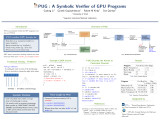 |
Li, Guodong; Gopalakrishnan, Ganesh; Kirby, Robert Michael Ii | PUG : A Symbolic Verifier of GPU Programs | PUG is a automated verifier for GPU programs written in C/CUDA. PUG verifies GPU kernels for Data Races, Barrier mismatches, Totally wrong results, and Weak memory model related bugs. SMT-based correctness checking methods for these error are often more scalable, general and modular. | | 2010-10-06 |
| 706 |
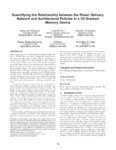 |
Balasubramonian, Rajeev | Quantifying the relationship between the power delivery network and architectural policies in a 3D-stacked memory device | Many of the pins on a modern chip are used for power delivery. If fewer pins were used to supply the same current, the wires and pins used for power delivery would have to carry larger currents over longer distances. This results in an "IR-drop" problem, where some of the voltage is dropped across t... | | 2013-01-01 |
| 707 |
 |
Freire, Juliana; Silva, Claudio T. | Querying and creating visualizations by analogy | While there have been advances in visualization systems, particularly in multi-view visualizations and visual exploration, the process of building visualizations remains a major bottleneck in data exploration. We show that provenance metadata collected during the creation of pipelines can be reused ... | Provenance; VisTrails; Pipelines; Query-by-example | 2007-11 |
| 708 |
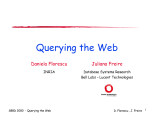 |
Freire, Juliana | Querying the web | Expose attendees to key concepts and technologies for finding, querying and integrating information on the Web Identify technical challenges in designing systems that support Web queries Survey recent literature, and discuss interesting research directions. | Webbase; Web navigation | 2000 |
| 709 |
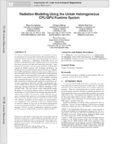 |
Berzins, Martin | Radiation modeling using the Uintah heterogeneous CPU/GPU runtime system | The Uintah Computational Framework was developed to provide an environment for solving fluid-structure interaction problems on structured adaptive grids on large-scale, long-running, data-intensive problems. Uintah uses a combination of fluid-flow solvers and particle-based methods for solids, toget... | | 2012-01-01 |
| 710 |
 |
Painter, James S. | Radioptimization - Goal based rendering | This paper presents a method for designing the illumination in an environment using optimization techniques applied to a radiosity based image synthesis system. An optimization of lighting parameters is performed based on user specified constraints and objectives for the illumination of t h e envir... | Radioptimization; Illumination; Optimization; Lighting parameters; Radiosity based image synthesis | 1993 |
| 711 |
 |
Carter, Tony M. | Radix-16 signed-digit division | For use in the context of a linearly scalable arithmetic architecture supporting high/variable precision arithmetic operations (integer or fractional), a two-stage algorithm for fixed point, radix-16 signed-digit division is presented. The algorithm uses two limited precision radix-4 quotient digit ... | Radix-16; linearly scalable; arithmetic architecture | 1988 |
| 712 |
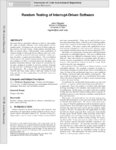 |
Regehr, John | Random testing of interrupt-driven software | Interrupt-driven embedded software is hard to thoroughly test since it usually contains a very large number of executable paths. Developers can test more of these paths using random interrupt testing-firing random interrupt handlers at random times. Unfortunately, na¨ıve application of random test... | | 2005-01-01 |
| 713 |
 |
Sivaraj, Hemanthkumar; Gopalakrishnan, Ganesh | Random walk based heuristic algorithms for distributed memory model checking | Model checking techniques suffer from the state space explosion problem: as the size of the system being verified increases, the total state space of the system increases exponentially. Some of the methods that have been devised to tackle this problem are partial order reduction, symmetry reducti... | Model checking; Distributed memory | 2003-01-29 |
| 714 |
 |
Bhanu, Bir; Henderson, Thomas C. | Range data processing: representation of surfaces by edges | Representation of surfaces by edges is an important and integral part of a robust 3-D model based recognition scheme. Edges in a range image describe the intrinsic characteristics about the shape of the objects. In this paper we present three approaches for detecting edges in 3-D range data. The ap... | Range data; Edges; Recognition scheme; 3-D | 1985 |
| 715 |
 |
Balasubramonian, Rajeev | Re-visiting the performance impact of microarchitectural floorplanning | The placement of microarchitectural blocks on a die can significantly impact operating temperature. A floorplan that is optimized for low temperature can negatively impact performance by introducing wire delays between critical pipeline stages. In this paper, we identify subsets of wire delays tha... | Microarchitectural floorplanning; Wire delays; Floorplanning algorithms; Microprocessor operating temperature; Critical loops; Pipelines | 2006 |
| 716 |
 |
Henderson, Thomas C. | Reaction-diffusion patterns in smart sensor networks | We introduced the use of Turing?s reaction-diffusion pattern formation to support high-level tasks in smart sensor networks (S-Nets). This has led us to explore various biologically motivated mechanisms. In this paper we address some issues that arise in trying to get reliable, efficient patterns... | Reaction-diffusion; Pattern formation; Smart sensor networks; S-Nets | 2003-11-05 |
| 717 |
 |
Henderson, Thomas C. | Reaction-diffusion processes as a computational paradigm | Turing introduced reaction diffusion systems (RD-systems) as a mechanism which made possible the differentiation of morphological structure. We have shown how these systems can be used to provide an information network for smart sensor systems. However, we propose here that reaction diffusion system... | Reaction diffusion systems; RD-systems; Computational paradigm | 2000 |
| 718 |
 |
Jacobson, Hans | Realizing burstmode circuits via STG speed independent synthesis | This report discusses the similarities and differences of STG and Burstmode specifications and synthesis methods. The first part of the report examines the applicability and efficiency of STG's single controller fork-join concurrency ability versus Burstmode's partitioned fork-join concurrency appr... | Burstmode circuits; STG | 1997 |
| 719 |
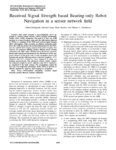 |
Henderson, Thomas C. | Received signal strength based bearing-only robot navigation in a sensor network field | This paper presents a low-complexity, novel approach to wireless sensor network (WSN) assisted autonomous mobile robot (AMR) navigation. The goal is to have an AMR navigate to a target location using only the information inherent to WSNs, i.e., topology of the WSN and received signal strength (RSS) ... | | 2014-01-01 |
| 720 |
 |
Hansen, Charles D. | Recent developments in parallel rendering | Using parallel computers for computer graphics rendering dates back to the late 1970s. Several papers published then focused on image space decompositions for theoretical parallel machines. Early research concentrated on algorithmic studies and special-purpose hardware, but the growing availability... | Parallel rendering; Massively parallel processors | 1994 |
| 721 |
 |
Bhanu, Bir | Recognition of 2-D occluded objects and their manipulation by PUMA 560 robot | A new method based on a cluster-structure paradigm is presented for the recognition of 2-D partially occluded objects. This method uses the line segments which comprise the boundary of an object in the recognition process. The length of each of these segments as well as the angle between successive ... | PUMA 560 robot; Cluster-structure paradigm; 2-D partially occluded objects | 1985 |
| 722 |
 |
Riloff, Ellen M. | Recognizing and organizing opinions expressed in the world press | Tomorrow's question answering systems will need to have the ability to process information about beliefs, opinions, and evaluations-the perspective of an agent. Answers to many simple factual questions-even yes/no questions-are affected by the perspective of the information source. For example... | Opinions; Opinion recognition; World press; MPQA project; Multiple perspectives | 2003 |
| 723 |
 |
Hansen, Charles D. | Reconstruction and visualization of planetary nebulae | Abstract-From our terrestrially confined viewpoint, the actual three-dimensional shape of distant astronomical objects is, in general, very challenging to determine. For one class of astronomical objects, however, spatial structure can be recovered from conventional 2D images alone. So-called planet... | | 2005-09 |
| 724 |
 |
| Reconstruction of sculptured surface using coordinate measuring machines | This paper presents a strategy for reverse engineering that uses a coordinate measur ing machine to reconstruct three dimensional sculptured surfaces. A rough initial model of the surface is generated manually. An iterative method is then used to refine the surface model until the error is within a ... | Reconstruction; Sculptured surface; Coordinate measuring machines | 1993 |
| 725 |
 |
Keller, Robert M. | Rediflow architecture prospectus | Rediflow is intended as a multi-function (symbolic and numeric) multiprocessor, demonstrating techniques for achieving speedup for Lisp-coded problems through the use of advanced programming concepts, high-speed communication, and dynamic load-distribution, in a manner suitable for scaling to upward... | Rediflow; Multi-function multiprocessors; Lisp-coded problems | 1985 |

























